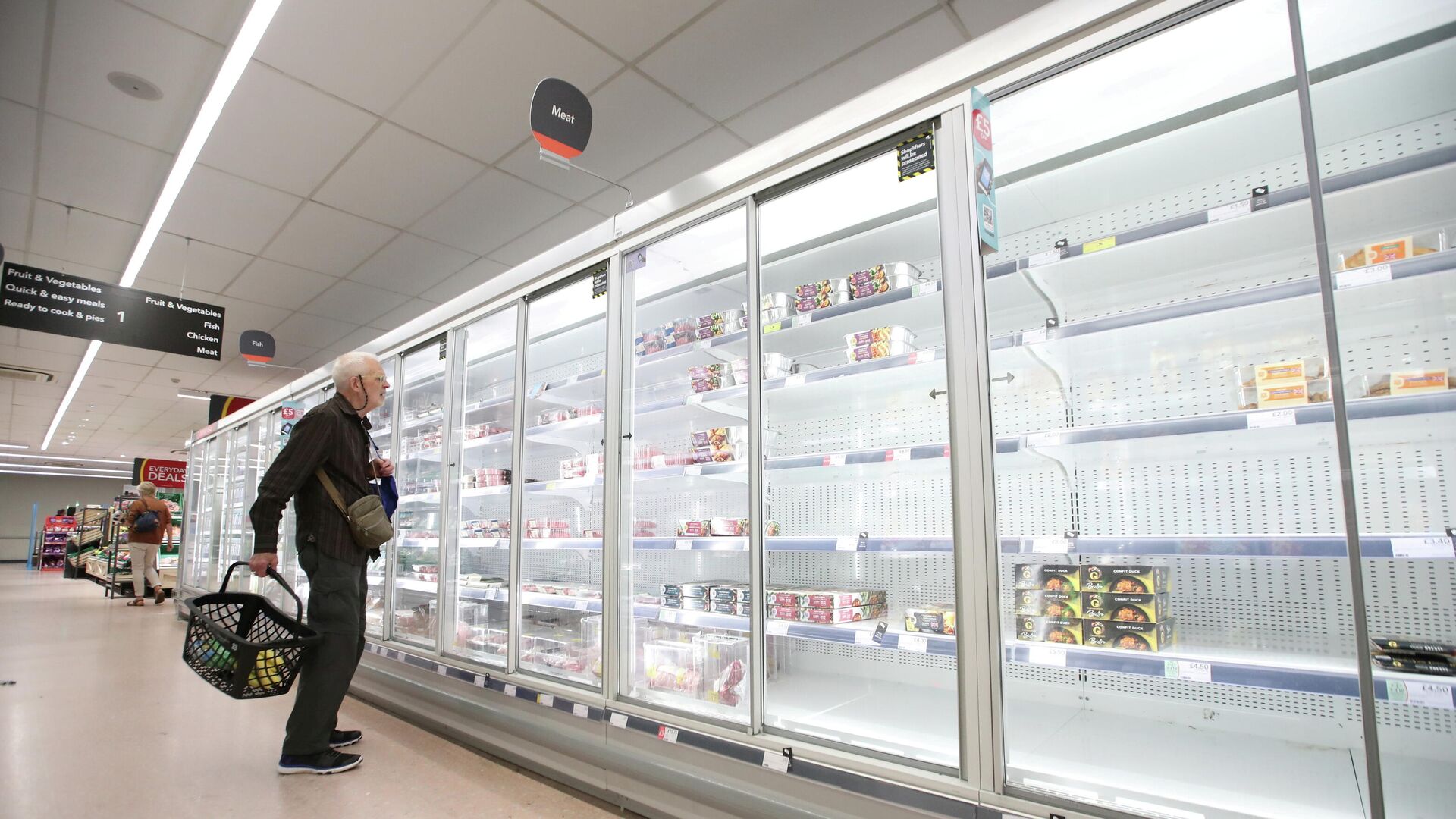Panic Buying 2.0: Sales of Frozen Turkeys Skyrocket in UK as Brits Brace for 'Nightmare' Christmas
12:29 GMT 04.10.2021 (Updated: 15:16 GMT 28.05.2023)

© REUTERS / PETER CZIBORRA / FILE PHOTO: A shopper looks at produce and empty shelves of the meat aisle in Co-Op supermarket, Harpenden
Subscribe
Since the end of September news of problems with fuel supplies has led to turmoil across the United Kingdom, with motorists rushing to stations to stock up on petrol, filling jerry cans and even plastic bags. Authorities have argued that there is enough fuel for everyone and urged people to not give in to panic buying.
Sales of frozen turkeys have skyrocketed in the United Kingdom following warnings of a "nightmare" Christmas, local media outlets have reported.
Supermarket chain Iceland, which specialises in frozen foods, said sales jumped 409 percent in September compared to the same period last year, while the word Christmas has been searched on its website 17,000 times in the last week alone, The Daily Telegraph writes. The rising demand made Iceland increase its order of turkeys by 20 percent, with the supermarket chain saying that people are "concerned about food supply".
Fears of food shortages before the festive event have grown in recent days as the government struggles to deal with the problems that caused the predicament, The Sun writes. It appears UK Prime Minister Boris Johnson's statement that problems with shortages could last well into the festive season did't help to ease the panic.
Fears of food shortages before the festive event have grown in recent days as the government struggles to deal with the problems that caused the predicament, The Sun writes. It appears UK Prime Minister Boris Johnson's statement that problems with shortages could last well into the festive season did't help to ease the panic.
'Nightmare for Consumers'
The current predicament was caused by a shortage of drivers for heavy goods vehicles, which then led to a domino effect – problems with supplies of fuel and disruptions of food deliveries to supermarkets. The situation has been exacerbated by rising gas prices, which in turn led to problems with the production of CO2 gas used in the food industry to extend the shelf life of products.
Experts and industry players have differently assessed the scope of the shortage crisis, with some saying that it will last well into the holidays and cancel Christmas, while others suggested that the situation will improve though the festive season will likely be marred.
Speaking to The Times, retail analyst Clive Black of Shore Capital suggested that store shelves won't be empty, but there will be a "distinct lack of choice", which Black described as a "nightmare for consumers".
Experts and industry players have differently assessed the scope of the shortage crisis, with some saying that it will last well into the holidays and cancel Christmas, while others suggested that the situation will improve though the festive season will likely be marred.
Speaking to The Times, retail analyst Clive Black of Shore Capital suggested that store shelves won't be empty, but there will be a "distinct lack of choice", which Black described as a "nightmare for consumers".
"Shortages of labour have meant businesses have not laid down the same number of turkeys or planted the same number of crops. Equally if the CO2 problem does not settle, expect beer and carbonated soft drinks to be in short supply – and a lot more expensive", the analyst said.
Authorities insist that Christmas is in no threat. Conservative Party Chair Oliver Dowden made a cast iron guarantee that the Tories "will makes sure that people have their turkeys for Christmas". Ministers have argued that the petrol crisis has started to ease and will soon be over.
Industry players seem to disagree, they emphasise that the key to solving food shortages is not by increasing deliveries of petrol, but dealing with the shortage of heavy goods vehicle (HGV) drivers.
Industry players seem to disagree, they emphasise that the key to solving food shortages is not by increasing deliveries of petrol, but dealing with the shortage of heavy goods vehicle (HGV) drivers.
"HGV drivers are the glue which holds our supply chains together. Without them we are unable to move food and other goods around the country", said Andrew Opie from the British Retail Consortium.
